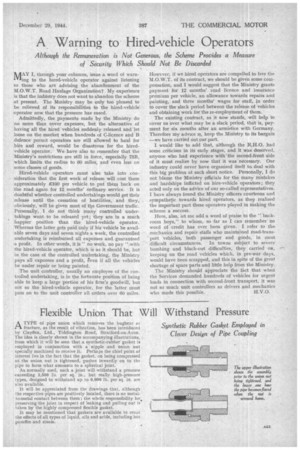A Warning to Hired-vehicle Operators
Page 23

If you've noticed an error in this article please click here to report it so we can fix it.
Although the Remuneration is Not Generous, the Scheme Provides a Measure of Security Which Should Not Be Discarded
VIM( I, through your columns, issue a word of warn"ling to the hired-vehicle operator against listening to those who are advising the abandonment of the M.O.W.T. Road Haulage Organization? My experience is that the industry does not want to abandon the scheme at present. The Ministry may be only too pleased to be relieved of its responsibilities to the hired-vehicle. operator now that the pressure has eased.
Admittedly, the payments made by the Ministry do no more than cover expenses, but the alternative of having all the hired vehicle § suddenly released and let loose on the market when hundreds of C-licence and B defence permit operators are still allowed to haul for hire and reward, would be disastrous for the hiredvehicle operator. We have also to remember that the Ministry's restrictions are still in force, especially 73B, which limits the radius to 60 miles, and even less on some classes of goods.
Hired-vehicle operators must also take into consideration that the first week of release will cost them approximately A100 per vehicle to put them back on the rOad again for 12 months' ordinary service. It is doubtful whether controlled undertakings would get their release until the cessation of hostilities, and they, obviously, will be given most of the Government traffic. Personally. I do not think many controlled undertakings want to be released yet; they are in a much happier position than the hired-vehicle operator. Whereas the latter gets paid only if his vehicle be available seven days and seven nights a week, the controlled undertaking is reimbursed all expenses and guaranteed a profit. In other words, it is" no work, no pay "-with the hired-vehicle operator, which is as it should be, but in the case of the controlled undertaking, the Ministry pays all expenses and a profit, tven if all the vehicles be under repair or being painted.
The unit controller, usually an employee of the controlled undertaking, is in the fortunate position of being able to keep a large portion of his firm's goodwill, but not so the hired-vehicle operator, for the 'latter must pass on to the unit controller all orders over 60 miles.
However, if we hired operators are compelled to free the IVI.O.W.T. of its contract, we should be given some compensation, and I would suggest that the Ministry grants payment for 12 months' road licence and insurance premium per vehicle, an allowance towards repairs and painting, and three months' wages for staff, in order to cover the slack period between the release of vehicles and obtaining work for the re-employment of them.
The existing contract, as it now stands, will help to cover us over what may be a slack 'period, that is, payment for six months after an armistice with Germany. Therefore my advice is, keep the Ministry to its bargain —we have carried out our part.
I would like to add that, although the 11,11.0. had some criticism in its early stages, and it was deserved, anyone who had experience with the second-front side of it must realize by now that it was necessary. Our industry could never have organized itself to. deal with this big problem at such short notice. Personally, I do not blame the Ministry offigials for the many mistakes and hardships inflicted on hire-vehicle operators; they acted only on the advice of our so-called representatives. I have always found the Ministry officers courteous and . sympathetic towards hired operators, as they realized the important part these operators played in making the scheme a success.
Here, also, let me add a word of praise to the "backroom boys," to whom, so far as I can remember no word of credit has ever been given. I refer to the mechanics and repair staffs who maintained road-trans. port 'vehicles, both passenger and goods, in most difficult circumstances. In towns subject to severe bombing and black-out difficulties, they carried ma, keeping on the ,road vehicles which, in pre-war days, would have been scrapped, and this in spite of the great shortage of spare parts and little help from the Ministry.
The Ministry should appreciate the fact that when the Services demanded hundreds of vehicles for urgent loads in connection with second-front transport, it was not so much unit controllers as drivers and mechanics who made this possible. H.V.O.




















































